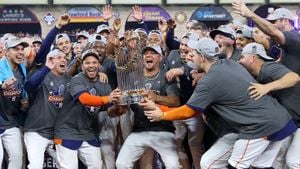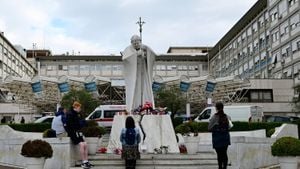The Ramadan Expo 2025 is set to be hosted at the Jaarbeurs in Utrecht, and it has sparked significant controversy over the presence of three contentious Islamic speakers: Abu Bakr Zoud, Ali Hummada, and Mohammed Hijab.
Initially, Dutch ministers Marjolein Faber and David van Weel had sought to deny these speakers entry to the Netherlands. They argued convincingly, citing concerns about the speakers inciting hate and justifying violence. Faber, the Minister of asylum and migration, expressed her dissatisfaction over the situation, stating, "Wij vonden het zwaar genoeg en wat mij betreft zijn ze nog steeds niet welkom." (We found it severe enough, and as far as I'm concerned, they are still not welcome.)
Despite these efforts, the court quickly overturned their attempts, ruling against the government, with the judge stating, "De rechter oordeelde dat de minister onvoldoende had uitgelegd waarom de komst van de sprekers een gevaar vormde" (The judge ruled the minister did not adequately explain why the arrival of the speakers posed any danger). This ruling highlights the challenging balance between freedom of speech and public safety.
The aforementioned speakers have previously generated controversy and scrutiny for their radical views, yet the court's decision has now placed them within the public eye as they prepare to address attendees at the Expo. Their presence calls to mind several instances of the government trying to restrict similar figures from entering the country.
One prominent case was of Mohammed Khatib, who was denied entry to the Netherlands for allegedly legitimizing violence against Israel, among other accusations. Similarly, British conspiracy theorist David Icke was barred from speaking at events as authorities cited concerns about potential disorder and rising antisemitism.
This background brings forth the pressing question of how the government positions itself with respect to controversial figures. David van Weel, the minister of justice, hinted at future actions to potentially limit the speakers' presence, stating, "Van Weel gaat nog met collega Faber de mogelijkheden onderzoeken om het trio predikers alsnog de toegang tot het land te ontzeggen" (Van Weel will still explore the options with colleague Faber to deny the trio of preachers access to the country).
The role of the National Coordinator for Counterterrorism and Security (NCTV) also looms large, having provided information about the speakers to the ministers. The NCTV indicated certain statements made by Zoud, Hummada, and Hijab might have been taken out of their intended contexts. A significant point raised was how Zoud, for example, denounced violence against individuals based on their sexual orientation and condemned any physical or verbal aggression, which contributed to the court's finding of no imminent threat posed by the trio.
The tension builds over the ramifications of the upcoming Expo. Brussels has urged member states to uphold checks on public gatherings to prevent potential extremist activities. The outcome of this case will likely have ripple effects within the fabric of Dutch society as communities navigate their collective stance on freedom of expression against potential extremism.
How society reacts during the Expo will play a significant role. Observers will look closely to see whether the speeches by the controversial figures breach legal limits. The ministers have made it clear they will be watching closely and will act if necessary. “Als ze strafbare uitingen doen, zal aangifte worden gedaan” (If they make criminal statements, charges will be filed), announced van Weel, signaling the government's steely resolve to curtail any unacceptable speech.
There is no doubt the emergence of these challenges will intensify discussions around religious freedom, public safety, and the responsibilities of leaders to protect societal unity. The intersecting paths of law, governance, and public opinion are at stake, with the Expo serving as the next focal point.
The outcome of the Ramadan Expo holds significance for broader discussions on integration, belonging, and the expectations society places on its leaders concerning contentious topics, especially relating to radical speech. Will the government uphold its principles, or will it yield to the sentiments of fear and exclusion? Only time will reveal the true ramifications of this event within the Dutch society.



